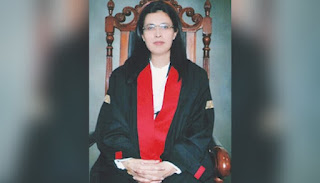Equity Ayesha Malik set to turn out to be first lady SC judge in 74-year history
Equity Ayesha Malik set to turn out to be first lady SC judge in 74-year history
Lahore High Court's Justice Ayesha Malik is set to turn into the main lady judge in the Supreme Court of Pakistan — in the country's 74-year history.
The choice is set to happen during a gathering of the Judicial Commission on August 9, which will be led by Chief Justice of Pakistan Justice Gulzar Ahmed, sources said.
The body is thinking about delegating Justice Malik as an appointed authority for the top court, sources said, as SC's Justice Mushir Alam is going to resign on August 17.
Equity Malik positions number four on the status rundown of the LHC.
Brought into the world in 1966, Malik finished her fundamental instruction from schools in Paris, New York, and Karachi, as indicated by the LHC's site.
She finished her BCom from the Government College of Commerce and Economics, Karachi, and examined law at Pakistan College of Law, Lahore.
She did LLM from Harvard Law School and has likewise worked with Fakhurddin G Ebrahim. Equity Malik has showed up in the high courts, locale courts, banking courts, unique councils, and intervention courts.
The equity was called upon as a specialist observer in family law cases directed in England and Australia including issues of kid guardianship, separate, ladies' privileges, and established insurance for ladies in Pakistan.
Milestone two-finger test judgment
Equity Malik gave her milestone judgment back in June, when she had proclaimed virginity tests for assessment of rape survivors "illicit and against the Constitution of Pakistan."
A solitary seat drove by Justice Malik reported the decision in a bunch of petitions, documented in March and June 2020 by rights activists alongside a PML-N administrator.
In the 30-page judgment, the adjudicator composed that the two-finger test (TFT) and hymen test have no clinical premise or criminological worth in instances of sexual viciousness and announced that virginity tests "annoy the individual poise of the female casualty and thusly is against the right to life and right to pride revered in Article 9 and 14 of the Constitution".

Comments
Post a Comment